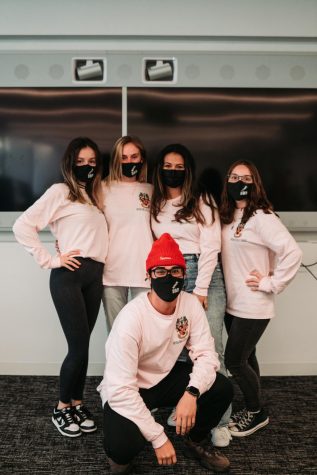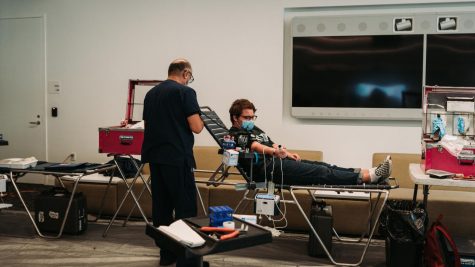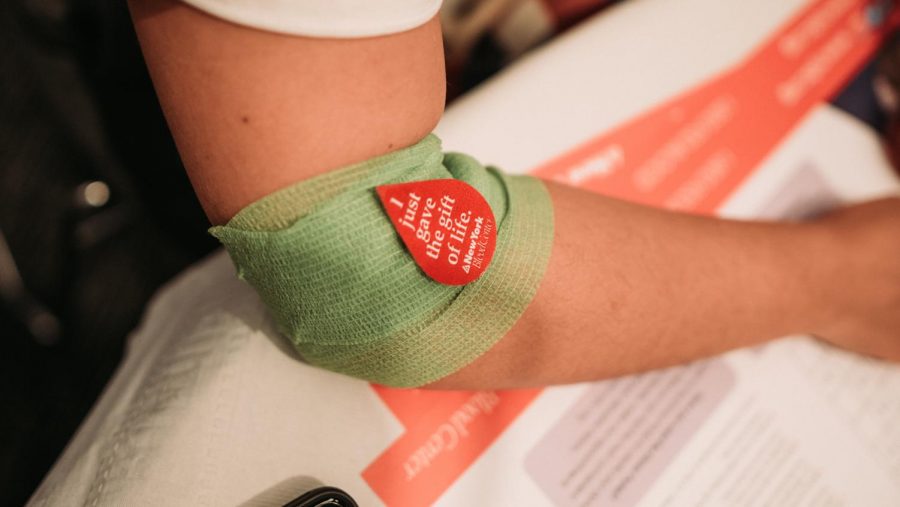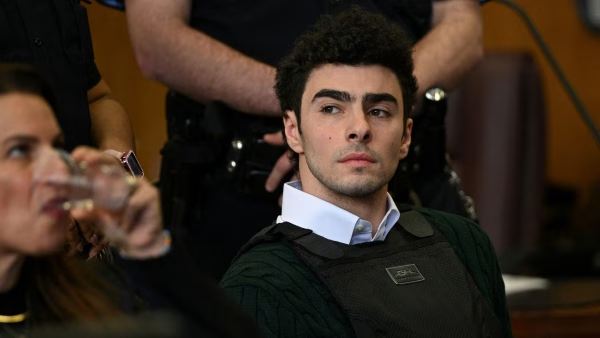Beta Beta Beta hosts University blood drive
November 10, 2021
In conjunction with the New York Blood Center (NYBC), the University’s National Biology Honor Society, Beta Beta Beta, also known as TriBeta, hosted the University’s first blood drive in five years on Oct. 25. The event anchored a remarkable milestone and initiative hoped to be implemented as a biannual legacy.
University junior Emma Brown is the TriBeta President majoring in Behavioral Neuroscience with a minor in Organic Chemistry. As the president, Brown is responsible for overseeing the organization’s events and overall ensures everyone involved in TriBeta is “engaged and feels a part of the organization’s community.”
Brown stated, “As an organization, Beta Beta Beta makes it a priority to give back to our community in some way every semester. For example, in previous years, we have made health packs to give to the community containing soap, toothpaste, toothbrushes, band-aids, and water bottles.”
University senior Nikki Rittenhouse is TriBeta’s Vice President majoring in Biology. As Vice President, Rittenhouse helps organize and coordinate the society’s in-person and remote events and delegates work for other E-board members.
According to Rittenhouse, a total of 76 people registered to donate Whole Blood and Double Red Cells, but only 60 were eligible for donations. In addition, 46 people had a registered appointment before the start of the event. According to Brown, it was more than Weill Cornell Medicine, New York University, and Marymount University had before their blood drives with NYBC.
University senior Elise Krupoff is TriBeta’s Secretary majoring in Biological Psychology and first presented the idea of hosting a blood drive on behalf of the honor society. Krupoff’s responsibilities include tracking attendance at events, helping organize and host events, and submitting approval forms for room requests.
Krupoff said, “In high school, I received community service hours for participating in the blood drive, and that inspired me to host one at Pace University. It was something I had thought about during all four years that I was here but never had an opportunity until now.”
“We also made this event a volunteering opportunity to those on campus who wish to gain service hours or be a part of such a great cause. We had 20 volunteers,” Brown noted.
University junior Johnathan Alimov is TriBeta’s Treasurer and majors in Biology. Alimov is in charge of creating the organization’s budget for the academic year and submits purchase requests for their events. Alimov shared with The Pace Press the importance of the shortage of blood donations in New York City and why TriBeta wanted to contribute to the cause.

“The NYC Blood Center declared a blood shortage after blood supplies dropped below minimum requirements. Blood donations are crucial for hospital patients in numerous circumstances. For example, patients who have given birth, experienced a traumatic injury, surgeries, etc. Our E-board felt like hosting a blood drive was our civic duty to help people in need,” Alimov said.
Krupoff and Rittenhouse provided The Pace Press with an in-depth description of the types of donations the University collected during their six hours of operation: Whole Blood Cell and Double Red Blood Cell donations.
“There was a whole-blood cell, which is a regular donation that people typically think of when they donate. Then double red blood cells, which donate twice the usual amount of blood, but they separate the white blood cells from the red and keep the red blood cells. There were 46 pints of whole blood donated and 14 pints of double red blood cells donated,” said Rittenhouse, who donated a regular whole-blood cell donation.
“Whole blood is the most flexible type of donation; it takes about 1 hour to donate and is ideal for all blood types. It can be transfused in its original form or used to help multiple people when separated into its specific components of red cells, plasma, and platelets. Whole blood is frequently given to trauma patients and people undergoing surgery. You can give whole blood once every 60 days,” Krupoff stated.
Other types of donations can be collected but only at Red Cross donation centers. However, Krupoff shared different ways students can donate through Power Red, Platelet, and AB Elite donations with the university community.
“During a Power Red donation, you give a concentrated dose of red cells, the part of your blood used every day for those needing transfusions as part of their care. This type of donation uses an automated process that separates your red blood cells from the other blood components and then safely and comfortably returns your plasma and platelets to you. Red cells from a Power Red donation are typically given to trauma patients, newborns, emergency transfusions during birth, people with sickle cell anemia, and anyone suffering blood loss. It takes about 1.5 hours at the blood drive. It is ideal for blood types O positive, O negative, A negative, and B negative and can be donated three times per year,” Krupoff explained.
He continued, “Platelets are tiny cells in your blood that form clots and stop bleeding. Platelets are most often used by cancer patients and others facing life-threatening illnesses and injuries. In a platelet donation, an apheresis machine collects your platelets along with some plasma, returning your red cells and most of the plasma back to you. A single donation of platelets can yield several transfusable units, and it takes about five whole blood donations to make up a single transfusable unit of platelets. Platelets are a vital element of cancer treatments and organ transplant procedures and other surgical procedures. It takes about 2.5-3 hours, and the ideal blood types are A positive, A negative, B positive, O positive, AB positive, and AB negative. You can donate every seven days.”
“During an AB Elite donation, you give plasma, a part of your blood used to treat patients in emergencies. AB plasma can be given to anyone regardless of their blood type. Plasma is collected through an automated process that separates plasma from other blood components, then safely and comfortably returns your red blood cells and platelets to you. AB Elite maximizes your donation and takes just a few minutes longer than donating blood. AB Plasma is used in emergency and trauma situations to help stop bleeding. It takes about 1 hour and 15 minutes for an AB Elite donation. The ideal blood types are AB positive, AB negative, and you can donate once a month,” Krupoff concluded.
Coordinating and deploying a seamless blood drive was incredibly rewarding for the TriBeta Executive Board, especially during the “12-12:30 rush” that Rittenhouse described as a “great moment and really cool to witness.”
“The most exciting moment of this whole blood drive for me was hearing that we had reached our goal of 60 pints and beat NYU, Weill Cornell, and Marymount for the number of pints collected! Woohoo, go Setters!” Brown said enthusiastically.

But with any significant event, there are always “hoops to jump through,” noted Brown, especially “due to the pandemic and on-campus restrictions.” Not to mention, hosting an on-campus blood drive required involvement from the University’s legal team.
“I first reached out to the New York Blood Center at the end of April in 2021. Soon I got in contact with Kathy from NYBC, and she became my direct resource for all things blood drive. After speaking with Kathy, I set up a meeting with Jimmy [Woods-Corwin], who is the Budget Manager for the Center of Student Engagement,” Brown said.
“Jimmy did the hard work and did Beta Beta Beta a huge favor by having meetings with Pace legal to sort through all the legalities to allow New York Blood Center as a vendor on campus. There are many legalities when hosting a blood drive at a university because someone is sticking a needle in you and drawing your blood. But the organization did not have to be on top of any legalities because Pace University is responsible for the health and well-being of its students, staff, and faculty when on campus,” she gratefully expressed.
If you didn’t get the chance to donate blood this fall, have no fear! TriBeta is hosting another blood drive with NYBC next February during the Spring 2022 semester.
Brown shared, “Our event was so successful that we want to make this a tradition, and quite possibly something that Beta Beta Beta can continue to do in the future. Overall, the feeling of being able to help so many individuals was so rewarding. Getting to bring the school together to help our community is exactly what we wanted as an organization,”












